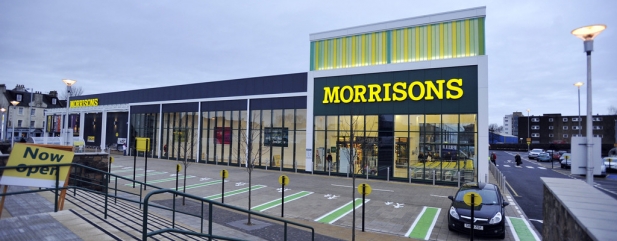Archived article
Please note that tax, investment, pension and ISA rules can change and the information and any views contained in this article may now be inaccurate.
Morrisons has momentum

WM Morrison Supermarkets’ (MRW) impressive turnaround continues under chief executive David Potts’ Fix, Rebuild and Grow strategy.
It recently reported a forecast-beating 1.6% growth in like-for-like sales (ex-fuel) for the 13 weeks to 30 October.
This represented a fourth quarter of like-for-like sales growth on the spin, although total sales were 1.2% lower due to supermarket closures and the sale of convenience arm M local.
By going back to the basics of low prices, great value and fresh food, Morrisons is successfully battling Asda, Aldi and Lidl and has momentum at its heels.
Less affected by falling pound
We acknowledge the groceries industry remains fiercely competitive and headwinds include higher wages and the fall in sterling.
Yet Morrisons is better insulated against the plunging pound’s impact on imported food prices than rivals as a high proportion of its food is produced in the UK.
We like Morrisons’ wholesale supply agreement with Amazon (AMZN:NDQ). There is merit to a renegotiated tie-up with Ocado (OCDO) and we also like a joint venture with dry cleaning, photo processing and shoe repair firm Timpson – ‘Timpson at Morrisons’ – all inspired moves from the entrepreneur Potts.
Fourth quarter earnings last year were good so Morrisons faces tough comparative figures to beat this year. We’ll find out how it fared when a trading update is published on 10 January 2017.
Improving financial profile
The business has a freehold property-backed balance sheet and generates decent amounts of cash that is reinvested into shops. It has a £1.2bn year-end net debt target, which is more than half the £2.82bn figure at the end of the 2014 financial year.
For the year to 31 January 2017, Shore Capital forecasts pre-tax profit of £330m (2016: £302m) for earnings per shares of 10.6p (2016: 9.6p) and a 5.3p dividend.
A year later, the broker looks for £356m pre-tax profit, 11.5p earnings per share and 5.7p dividend.
On these estimates, Morrisons does trade on a punchy ‘recovery’ multiple of 20.7 with a yield of 2.4%, yet we have faith in the recovery under the mercurial Potts. He could surprise with further innovative, value-adding deals.

We are big fans of Morrisons and believe the shares are well worth buying at 219.7p as a long-term holding.
Important information:
These articles are provided by Shares magazine which is published by AJ Bell Media, a part of AJ Bell. Shares is not written by AJ Bell.
Shares is provided for your general information and use and is not a personal recommendation to invest. It is not intended to be relied upon by you in making or not making any investment decisions. The investments referred to in these articles will not be suitable for all investors. If in doubt please seek appropriate independent financial advice.
Investors acting on the information in these articles do so at their own risk and AJ Bell Media and its staff do not accept liability for losses suffered by investors as a result of their investment decisions.

 magazine
magazine









